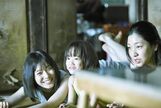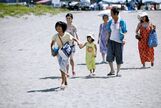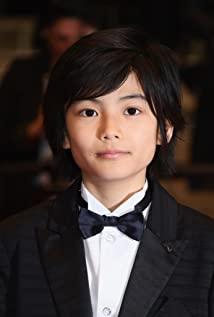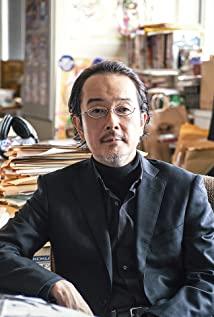I went to the cinema to see this movie in the first week of its release in Japan, and when I came out, two Japanese girls were crying in the bathroom. The Japanese who was with me was waiting for me in the aisle at the door of the bathroom, saying that he also saw two people crying. The Japanese themselves also like this movie very much. Here is a film review I saw written by Kakuta Hikaru. The translation is as follows. The newspaper has also taken pictures, and those who are interested can check it out.
Text/Translation by Kakuda Mitsuyo/Li Ting
After watching this movie, the headlines and news that I have seen in the newspapers in recent years come to my mind one by one. Reduction plan for living assistance expenses, problems with poor children, child abuse incidents, fraudulent annuity claims, etc. I have also seen news of parents being arrested for letting their children steal. When I see this kind of news, the impression that comes to my mind is so different from what the movie depicts, it can even be said to be completely different.
Grandma, father and mother, mother's sister, little boy, a family of five lived together in a very old and simple one-family house. All kinds of things are piled up in the narrow home, and the family lives together tightly. Although it's not the kind of family that doesn't quarrel all day, it's definitely not a good relationship. However, the final outcome was unexpected.
Dad and the little boy found a little girl placed outside in the downstairs of the condominium in the cold twilight. Suspected abusive dad brought the little girl home. From that day on, the little girl became the little boy's sister. From here, it can be seen that the direction of the story, the end of the family begins to be swayed by the unknown.
They share a feeling that only someone who knows the pain of being abused can tell. It's a code that can't be translated into words. Also, the strength that only those who know the pain can have, also enables them to support each other. This is not goodwill, nor justice, nor sympathy. For them, the awareness of [helping others] does not exist. For them, they just instinctively reached out.
Those mentioned above, and they are criminals are two completely different things. Just like there are positive and negative sides to things. It is precisely because the principle of their action is neither good will nor justice that makes them sin, or incites others to sin. Just as I instinctively stretched out my hand when facing the weak, I also wanted to do something to help me when I was in the position of the weak. Bringing home a child shivering in the cold is no different to them than stealing something the child loves.
Eat together, listen to the sound of fireworks, listen to storytelling, and go on family trips together. The family quietly lived a very ordinary life. Gradually cracks appeared in this calm, and the family eventually had to fall apart.
The secret code shared by people in this family is naturally incomprehensible to people outside the family. This kind of thing that cannot be understood by outsiders is what is most feared by outsiders. To understand this stuff, put them in the offender's entry. It is most convenient to attribute this reason to the [darkness of human nature] when horrors beyond imagination occur. Through such a classification, people in the world will feel at ease and feel that this is a world that has nothing to do with them. Of course, we're part of the world that sees child abusive parents as vicious and habitual stealers as problematic. We don't think of such people as human beings like ourselves. So a line has to be drawn between us and them.
When I saw the title of the actual social event, it was completely different from the impression of this movie - it was so, and then I suddenly understood the reason. Because of this movie, we didn't let us draw that line. The film reminds us that in the world we live in, they live in the same world—the world they live in also has our presence. At this time, what you see in news magazines is no longer someone else's business, but becomes a story in the real world we live in.
Demarcating things that we don't fully understand, and things we don't want to understand, and discussing them separately from ourselves, sometimes makes things too stereotyped and forces us to give up looking inside things and What's on the side and deep? It will make us forget the fact that there are only good and good people, and there are only malicious wicked people. Good people make mistakes, we will say [Sure enough, not a good person! ] Don't think about anything, just revel in being on the right side. For such a pure and overly simple society, this film brings a strong sense of disobedience.
In the movie, the father reads the picture book "Suimi" to his son. There are stories of small fish gathering to imitate the big fish and chasing after the hungry big fish. What exactly is a big fish? What is a small fish? Which one are we? Which one do you want to be? What is better to start believing now? The world created by the movie also flows into my real world at the moment when the movie ends. This is how I feel.
View more about Shoplifters reviews










